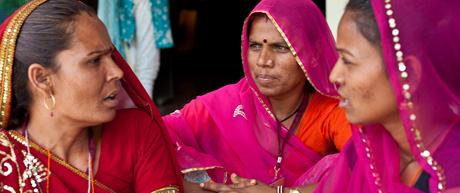Programmes

UN Women supports the Government to prevent trafficking in districts that are the sources of trafficking. The strategy focuses on greater community action at the Panchayat (village council) level to prevent trafficking. Working with survivors of trafficking and communities at source, transit and final destinations, UN Women helps to identify and deal with the underlying causes for trafficking.
In order to increase inheritance rights for women affected by HIV, UN Women has equipped women’s groups and legal rights organizations with stronger skills and capacity. The Positive Women’s Network (PWN) in India has emerged as a strong champion for gender and human rights, both regionally and globally. UN Women has also developed gender policy guidelines for the National AIDS Control Programme in India.
In New Delhi, UN Women makes public spaces safer for women as part of the Global Safe Cities programme. Each city is developing a model to stop violence against women and girls, and this will be adapted by other cities around the world. A baseline survey done by the Government of Delhi, JAGORI and New Concept showed that in the absence of support, women commuters are troubled even more if they confront the harassers. The survey was conducted with a total sample of 5,010 men, women and common witnesses. Women of all classes have to contend with harassment as part of their daily lives. School and college students in the 15-19 age-group and women workers in the unorganized sectors are particularly vulnerable. Public transport, buses and roadsides are reported as spaces where women and girls face high levels of sexual harassment.
Through technical expertise and critical partnerships, UN Women has provided critical inputs to implement and monitor the Domestic Violence Act 2005.
Maldives
To address the issue of violence against women, UN Women and the UN team in Maldives have conducted a number of interventions to improve the situation for survivors of domestic violence. UN Women recognised the need to build a resource to fight back, and supported the Department of Gender and Family Protection Services to strenghten rehabilitation services for survivors of domestic violence. This is being done by building the skills of officials in the Department and helping with the formulation of guidelines.
Domestic Violence Act: recently passed, the Domestic Violence Act is a testament to the dedication of the political parties, ministries, non-governmental organisations and grassroots activists who have worked towards the achievement of this goal. In collaboration with other UN agencies, UN Women contributed detailed inputs to the draft bills.
UN Women is supporting the national government in compiling a report about the major milestones achieved under the Convetion.
Along with other UN agencies, UN WOmen was also involved in the implementation of the CEDAW recommendations and other similar national and international instruments to improve the status of women in the country.
UN Women supports the implementation of the United Nations Development Assistance Framework 2011-2015, specifically addressing outcome 15 which focuses on gender equality.